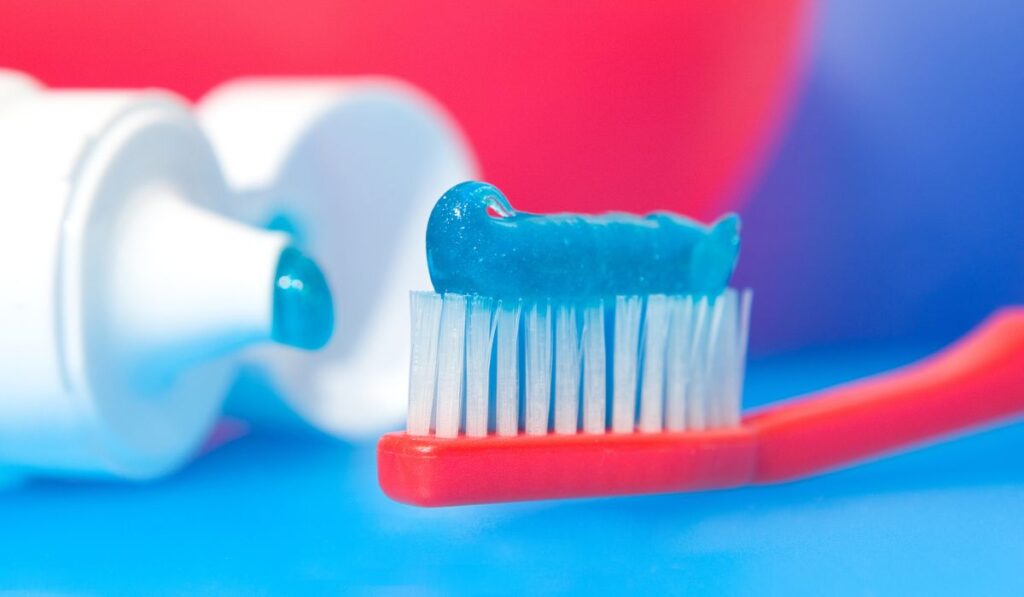Most kinds of toothpaste contain fluoride, and oral health companies often market it as the key ingredient to clean your teeth. That’s because fluoride has been proven to reduce the risk of cavities and strengthen the tooth enamel. But are there any risks that come with using fluoride toothpaste?
There aren’t any risks of using fluoride toothpaste, as long as you don’t swallow it regularly. Toothpaste contains too little fluoride to be a health risk, but you’ll still have to take care when younger children use it. Too much fluoride ingestion from tap water poses a much bigger health risk.
Let’s take a closer look at why fluoride is used in toothpaste, what makes it so effective, and whether non-fluoride toothpastes are as effective.
What Is Fluoride?

Fluoride is a natural mineral found in rocks, soil, and natural water bodies. While most people are aware that fluoride is often present in toothpaste, fluoride is also added to many foods and even drinking water. Small amounts of fluoride have been proven to be effective at building stronger teeth, and it may even benefit your bones.
Fluoride is also used in many medical products and medical equipment, such as image scanners. It’s also used in some pesticides, as a cleaning agent, and to make Teflon, steel, and aluminum products.
Some countries add small amounts of fluoride to tap water, and even bottled mineral water may contain traces of fluoride.
How Does Fluoride Benefit Teeth?
Fluoride can reduce the risk of tooth decay, strengthen the tooth enamel, and remove tartar from teeth. Small amounts of fluoride in drinking water have been proven to prevent tooth decay by as much as 25%.
Some of the oral benefits of fluoride toothpaste include:
Reduces the Risk of Tooth Decay
Fluoride is one of the most effective minerals at fighting tooth decay. It slows down the production of bacteria that may form plaque and helps keep your teeth clean. Studies have shown that fluoride in the drinking water supply may reduce the risk of tooth decay by 25%.
However, the oral benefits of fluoride are only effective when it’s used orally, and ingesting it may cause the opposite effect and increase the risk of tooth decay.
Strengthens Tooth Enamel
What makes fluoride so effective, apart from keeping your teeth clean, is that it builds on the tooth enamel, gradually strengthening it. Eating sugary and acidic foods will slowly cause the minerals of the tooth to break down, causing tooth decay. Fluoride helps strengthen this layer to reduce the risk of decay.
When you use fluoride toothpaste, the fluoride will bond with calcium and other minerals, creating a shield around the teeth.
This is called “fluorapatite” and is the first line of protection for your teeth against sugars and acids. Brushing regularly with a good fluoride toothpaste, like Colgate (on Amazon), will strengthen your teeth, in addition to keeping them clean.
It Helps Remove Tatar and Other Bacteria
The antibacterial properties of fluoride toothpaste make it perfect for use in toothpaste and mouthwash. Years of research have shown that fluoride toothpaste is effective in removing bacteria and a buildup of tartar on teeth.
Dentists may use a purer form of fluoride paste to clean teeth thoroughly, although consumer toothpastes contain very little fluoride. Check out our guide to choosing the best toothpaste for more information on your options.
Risks Associated With Using Fluoride

While fluoride is safe when used orally, ingesting fluoride can result in many health conditions that range from mild to severe, depending on how much fluoride was ingested. Fluoride ingested over a long period of time can result in permanent skeletal deformation and other severe illnesses.
The most common risk of ingesting fluoride is that it may cause fluorosis, which results in the discoloration of teeth. Swallowing fluoride when brushing or drinking water with high fluoride levels can cause teeth to become yellow or develop white streaks. In severe cases of fluorosis, dark spots or pits may form on your teeth.
Ingesting fluoride in quantities well above the maximum recommended limit may cause skeletal fluorosis. The fluoride may cause the bones to develop abnormal layers of calcium and other minerals, causing deformation, bone pain, and stiffness. However, these conditions are rare and aren’t likely to be caused by ingesting small amounts of fluoride toothpaste.
While much of the scientific community agrees that the amount of fluoride in toothpaste is too low to cause long-term illnesses (even when ingested by mistake), exposure to high levels of fluoride in water and some foods may cause diabetes, cardiovascular problems, and thyroid dysfunction.
Some studies have shown that ingesting fluoride in water may affect the IQ of children, cause early puberty in girls, and even result in lower fertility rates. Fortunately, the fluoride levels in the tap water supplied in most countries are too low to cause these issues.
However, there have been cases where too much fluoride was added to the water supply by mistake, resulting in illness and even death.
How Fluoride Affects Kids
Children under 6 months shouldn’t use fluoride toothpaste, and children under 8 years should be monitored carefully to make sure they don’t ingest it. However, children need trace amounts of fluoride in their drinking water to develop strong teeth.
Most areas have fluoride added to the tap water. You can always check with your municipality to see whether your tap water has fluoride and how much. Some bottled water brands also add fluoride to the water, which you can confirm through the label.
In areas where your child doesn’t get any fluoride through the tap or bottled water, you may give them fluoride supplements after consulting your doctor.
Fluoride-Free Toothpaste
While all FDA-approved fluoride toothpastes are completely safe to use, some people prefer to “go natural” and use fluoride-free toothpaste like Tom’s of Maine (on Amazon). Fluoride-free toothpaste contains cranberry extract, hydrated silica, and other natural ingredients designed to lower the mouth’s Ph and remove bacteria.
However, it’s not as effective as fluoride toothpaste and doesn’t do anything to strengthen the teeth. Nevertheless, if you have a health condition and your doctor has recommended that you avoid fluoride toothpaste, or if you’re looking for a toothpaste that’s safe for toddlers, you can use non-fluoride toothpaste to keep your teeth clean.


